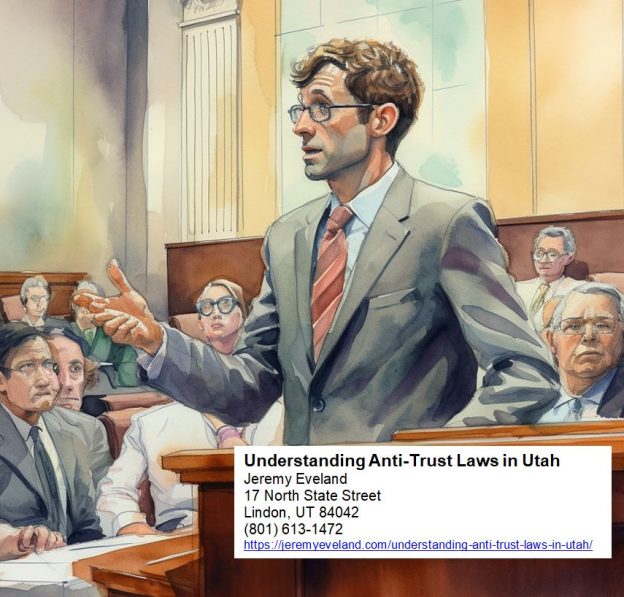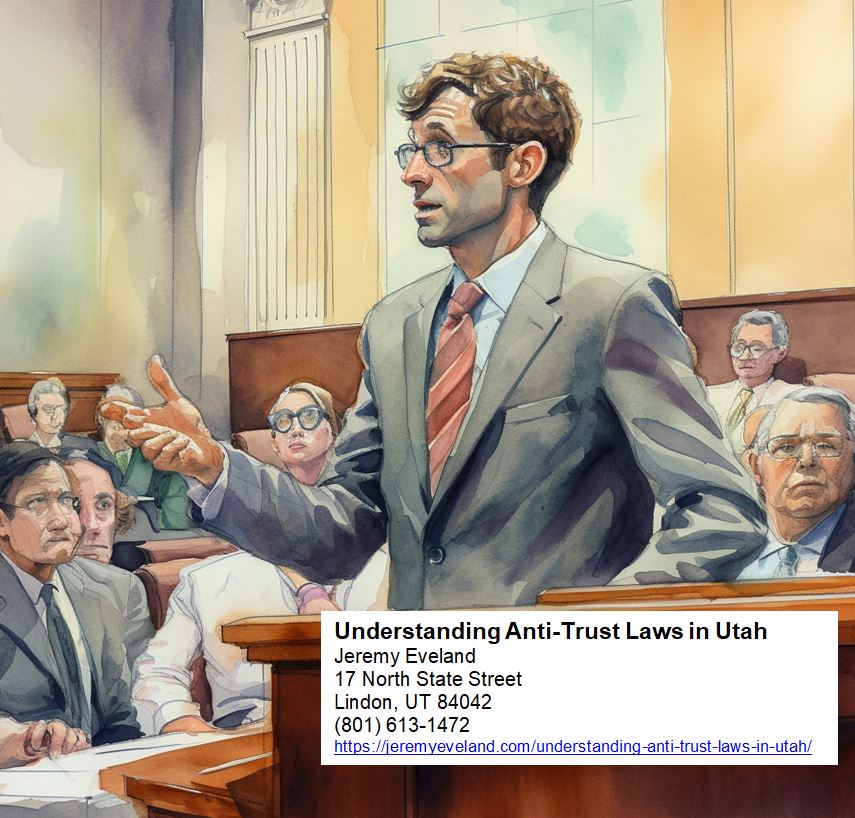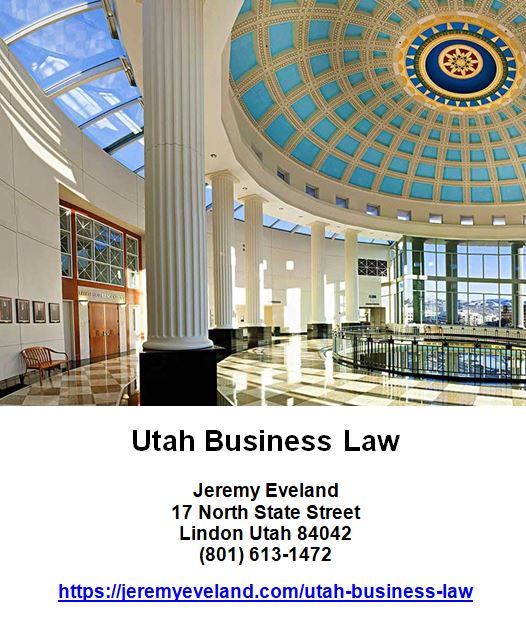Antitrust and competition law play a crucial role in maintaining fair and competitive markets. In an era where businesses are constantly striving to gain an edge over their competitors, it becomes essential for companies to understand and comply with these laws to avoid potential legal consequences. This article aims to provide you with a comprehensive overview of antitrust and competition law, shedding light on its significance, key principles, and potential implications for businesses operating in the State of Utah. By delving into the intricacies of this subject, we aim to equip you with the knowledge necessary to make informed decisions and navigate the legal landscape successfully.

What is Antitrust and Competition Law?
Antitrust and competition law refers to the body of legal principles and regulations established to promote fair competition and prevent anti-competitive behavior in the marketplace. These laws aim to protect consumers, ensure market efficiency, and encourage innovation by prohibiting practices and behaviors that harm competition.
Definition of Antitrust and Competition Law
Antitrust and competition laws are designed to regulate the behavior of businesses and prevent the abuse of market power. They aim to foster competition, create a level playing field for all market participants, and ultimately benefit consumers by ensuring a fair and open marketplace.
Purpose of Antitrust and Competition Law
The main purpose of antitrust and competition law is to promote competition and protect consumers from anti-competitive practices. These laws seek to prevent monopolies, restrain unfair trade practices, and maintain market efficiency, leading to enhanced consumer choice, lower prices, innovation, and overall economic growth.
Key Principles of Antitrust and Competition Law
There are several key principles that underpin antitrust and competition law. These include:
- Prohibition of anti-competitive agreements: Laws prohibit agreements between competitors that restrict competition, such as price-fixing, bid-rigging, and market allocation.
- Regulation of monopolies and abuse of dominance: Laws prevent monopolies from engaging in anti-competitive conduct, such as exclusionary practices or unfair pricing strategies.
- Merger control: Antitrust laws regulate mergers and acquisitions to prevent the creation or enhancement of market power that could harm competition.
- Enforcement and penalties: Authorities have the power to enforce antitrust laws and impose civil and criminal penalties on violators, including fines, injunctions, and divestitures.
The History of Antitrust and Competition Law
Origins of Antitrust and Competition Laws
The roots of antitrust and competition laws can be traced back to the late 19th and early 20th centuries. These laws emerged in response to concerns over the growing market power of large corporations, known as trusts, and the resulting harm to competition and consumers. The Sherman Act of 1890, the first federal antitrust law in the United States, was enacted to address these concerns.
Development in the United States
Antitrust law in the United States expanded significantly in the 20th century with the passage of additional legislation, such as the Clayton Act and the Federal Trade Commission Act. The Clayton Act, enacted in 1914, introduced provisions to prohibit anti-competitive mergers and acquisitions and provided more specific guidance on unlawful practices. The Federal Trade Commission Act created the Federal Trade Commission (FTC), which is responsible for enforcing antitrust laws and preventing unfair methods of competition.
International Expansion and Harmonization
Antitrust and competition law principles have been adopted and expanded upon by countries across the globe. As markets have become increasingly global, international cooperation on antitrust matters has become essential. Organizations such as the European Commission (EC) and the International Competition Network (ICN) facilitate cooperation and harmonization of antitrust policies and enforcement practices among different jurisdictions.
Types of Antitrust Violations
Price Fixing
Price fixing involves agreement among competitors to set prices at a predetermined level, eliminating competition and artificially inflating prices. This practice harms consumers by restricting choice and increasing prices.
Bid Rigging
Bid rigging occurs when competitors collude to manipulate the bidding process for public procurement contracts. Through bid rigging, conspiring companies can inflate prices and stifle competition, leading to waste of public funds.
Market Allocation
Market allocation refers to agreements between competitors to divide markets or customers among themselves, thereby limiting competition. This practice can result in higher prices, reduced consumer choice, and hindered innovation.
Monopolization
Monopolization involves the abuse of market power by a single company or entity. It occurs when a business unfairly gains or maintains a dominant position in the market, often through anti-competitive practices such as exclusionary conduct or predatory pricing.
Abuse of Dominance
Abuse of dominance refers to anti-competitive behavior by dominant companies that exploit their market power to harm competition or exclude competitors. This includes actions such as imposing unfair conditions, engaging in excessive pricing, or limiting access to essential facilities.
Antitrust Authorities and Enforcement
Federal Trade Commission (FTC)
The FTC is an independent agency in the United States responsible for enforcing antitrust laws and protecting consumers. It investigates anti-competitive conduct, enforces consumer protection laws, and educates the public about marketplace issues.
Department of Justice (DOJ)
The DOJ is another key U.S. agency responsible for enforcing antitrust laws. It has the authority to initiate civil and criminal proceedings against companies that engage in anti-competitive behavior.
European Commission (EC)
The European Commission plays a crucial role in enforcing antitrust laws within the European Union (EU). It investigates and addresses cases of anti-competitive conduct that affect the EU market, including abuse of dominance and cartel behavior.
International Competition Network (ICN)
The ICN is a network of competition authorities from around the world. Its purpose is to promote international cooperation and convergence in antitrust enforcement, facilitate information sharing, and develop best practices.
Antitrust Analysis and Legal Standards
Rule of Reason
The rule of reason is a legal standard used to evaluate the competitive effects of certain practices or agreements. Under this standard, the court weighs the pro-competitive benefits against the anti-competitive harm to determine if the practice violates antitrust laws.
Per Se Rule
The per se rule is a legal standard that treats certain practices as inherently anti-competitive and illegal without considering their specific effect on competition. Price-fixing and bid rigging, for example, are typically considered per se illegal.
Efficiency Defense
The efficiency defense allows defendants to argue that their anti-competitive behavior produces significant efficiency gains that benefit consumers. Courts consider factors such as cost reductions, innovation, and consumer welfare when applying the efficiency defense.
Market Definition and Market Power
In antitrust analysis, defining the relevant market is crucial to assessing the existence and abuse of market power. The market definition identifies the products or services and geographic area over which a firm operates. Market power refers to the ability of a firm to raise prices above competitive levels or exclude competitors.
Mergers and Acquisitions
Antitrust Review of Mergers and Acquisitions
Antitrust authorities review mergers and acquisitions to ensure they do not result in anti-competitive effects. They assess factors such as market concentration, potential harm to competition, and synergies that may arise from the transaction.
Horizontal and Vertical Mergers
A horizontal merger occurs when two companies that operate at the same level in the supply chain or offer similar products merge. Vertical mergers, on the other hand, involve companies operating at different levels of the supply chain merging.
Merger Control Guidelines
Antitrust authorities provide merger control guidelines that outline their approach to assessing and approving mergers. These guidelines provide clarity on factors considered, thresholds triggering review, and potential remedies to address anti-competitive concerns.

Antitrust Litigation and Remedies
Private Actions and Class Actions
Antitrust laws often empower private parties, including consumers and competitors, to bring lawsuits against violators. Class actions may consolidate claims from multiple plaintiffs who have suffered harm from anti-competitive practices.
Civil and Criminal Penalties
Antitrust violations can lead to civil penalties, such as fines, injunctions, and disgorgement of profits. In egregious cases, criminal penalties, including imprisonment, may be imposed on individuals responsible for the anti-competitive conduct.
Injunctions and Divestitures
Injunctions are court orders that prohibit certain behavior or require specific actions. Antitrust authorities may seek injunctions to prevent ongoing anti-competitive conduct. Divestitures involve requiring a company to sell off assets or businesses to restore competition.
Disgorgement of Profits
Disgorgement is the surrender of illicit gains resulting from anti-competitive behavior. It aims to deter future violations by removing the benefits obtained through illegal conduct and restoring competitive conditions.
International Perspectives on Antitrust Law
Comparison of Antitrust Laws in Different Jurisdictions
Antitrust laws vary across different jurisdictions, reflecting variations in legal systems and policy objectives. While the principles of promoting competition remain consistent, there are differences in enforcement methods, legal standards, and remedies available.
Harmonization Efforts and Challenges
Given the globalization of markets, harmonizing antitrust laws and enforcement practices is desirable. International organizations, such as the ICN, work to promote convergence in antitrust enforcement. However, challenges arise due to diverging legal systems, cultural differences, and differing interpretations of competition policy.

Antitrust Compliance Programs
Benefits of a Compliance Program
Implementing an effective antitrust compliance program offers several benefits, including:
- Minimizing the risk of engaging in anti-competitive conduct and violating antitrust laws.
- Demonstrating a commitment to ethical business practices and compliance with the law.
- Avoiding costly legal disputes, fines, and reputational damage.
- Educating employees about antitrust laws and fostering a culture of compliance.
Elements of an Effective Compliance Program
An effective antitrust compliance program typically includes the following elements:
- Leadership commitment: Demonstrated commitment to compliance from top-level management.
- Written policies and procedures: Clearly documented guidelines on compliance with antitrust laws.
- Training and education: Regular training programs to educate employees about antitrust laws and potential risks.
- Reporting mechanisms: Confidential systems for reporting potential violations or concerns.
- Auditing and monitoring: Regular assessment and review of compliance measures to identify and mitigate risks.
- Enforcement and disciplinary measures: Clear consequences for violations of the compliance program.
Case Studies on Successful Compliance Programs
Several case studies highlight the importance of effective antitrust compliance programs. These include landmark cases where companies avoided major legal consequences due to robust compliance systems. The adoption of an effective compliance program not only helps prevent violations but also serves as a mitigating factor if antitrust issues arise.
Antitrust in the Digital Age
Digital Platforms and Market Power
The rise of digital platforms has raised concerns about the concentration of market power and potential anti-competitive behavior. Dominant platforms may control access to essential services, engage in discriminatory practices, or acquire potential competitors to maintain their dominance.
Big Tech Investigations
Big Tech companies, such as Amazon, Google, and Facebook, have faced scrutiny from antitrust authorities worldwide. Investigations focus on allegations of anti-competitive behavior, including abuse of market power, data privacy violations, and anti-competitive acquisitions.
Challenges in Regulating the Digital Economy
Regulating the digital economy presents unique challenges for antitrust authorities. The fast-paced nature of technology, data-driven business models, and global reach require flexible and adaptive approaches. Balancing innovation and competition while protecting consumers and promoting fair markets is a key challenge in regulating the digital economy.
Frequently Asked Questions
1. Why is antitrust and competition law important? Antitrust and competition law is vital for maintaining fair and open markets. It prevents monopolies, ensures fair competition, protects consumers, fosters innovation, and promotes economic growth.
2. What are the consequences of violating antitrust laws? Violating antitrust laws can result in severe consequences. These may include hefty fines, injunctions, disgorgement of profits, imprisonment for individuals involved in criminal violations, and reputational damage.
3. How can businesses ensure compliance with antitrust laws? Businesses can ensure compliance by implementing effective antitrust compliance programs. Such programs include leadership commitment, written policies and procedures, employee training, reporting mechanisms, auditing and monitoring, and enforcement measures.
4. What are some current challenges in regulating the digital economy? Regulating the digital economy poses challenges due to rapid technological advancements, the global nature of digital platforms, and complex data-driven business models. Balancing innovation and competition while protecting consumers and fostering fair markets is a key challenge.
5. How can a business lawyer assist with antitrust and competition law matters? A business lawyer specialized in antitrust and competition law can guide businesses through compliance programs, advise on merger reviews, represent clients in antitrust investigations, and provide legal counsel on competition-related matters. They can help navigate complex laws and protect the interests of businesses in the competitive marketplace.



















